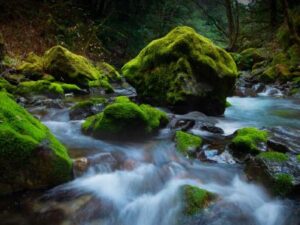Located in the north of Mozambique sits Mount Mabu, home to a medium-altitude forest famous for its old-growth trees. The forest sits high above the lowlands and provides a unique spectacle for scientists with its very own ecosystem that in many ways is isolated from the surrounding area. Therefore, Mabu is commonly referred to as ‘sky island’ home to an extremely diverse range of wildlife, many of which have never been recorded before by scientists.

Mount Mabu was first discovered by those outside of Mozambique in 2004 when Professor Julian Bayliss was looking over satellite imagery of the mountain range. He noticed a dark spot, that to his knowledge had not previously been recorded, and so the following year Bayliss set out on an expedition to this unknown area. The forest is well known to locals, with many utilising the forest to maintain healthy livelihoods, but the recording outside of Mozambique was largely undocumented. Bayliss’ expedition uncovered that the forest was in very good condition, and it was in fact the largest single block of rainforest in Southern Africa.
After this initial expedition in 2004, multiple research trips have been undertaken to Mount Mabu as the ecological understanding of the region presented something new and interesting to scientists. As the rainforest is at a higher altitude than the surrounding lowlands, the animals and insects that inhabit the forest are unlikely to meet or breed with other populations outside of the forest. This means that the possibility of evolution within this isolated ecosystem presents something new to scientists to understand how this isolation has developed new species not seen in other places on the globe. In fact, throughout the expeditions over the years, more than 25 new species have been identified including snakes, butterflies, dung beetles and chameleons.
Large animals such as lions and rhinos no longer inhabit the forest, thought to be due to the civil war that for many years kept this part of Mozambique untouched by the outside world. However, the potential to study new species on Mount Mabu is very exciting for scientists, as they can see the effect of isolated evolution across the rainforest, whilst searching for rare species that are thought to be extinct in other places where deforestation has destroyed habitats. On one conservation trip, researchers were hunting for the Manuli Apalis, Africa’s rarest bird, to see if it was still present on the mountain range. The researchers actually captured its call, highlighting that the ‘sky island’ holds so many vital species that will provide essential understanding for conservation scientists and researchers going forward.
Today, Mount Mabu has been given special conservation rights by the Mozambique government and will be turned into a community-protected area where no mining or logging will be allowed. The land will instead be a place of research and conservation, with only those in the local community who rely on the forest for their livelihoods will be able to use it. As research on Mount Mabu continues to be conducted, it is thought that the magic of the ‘sky island’ will bring with it the discovery of many new and exciting species.
Sources:







